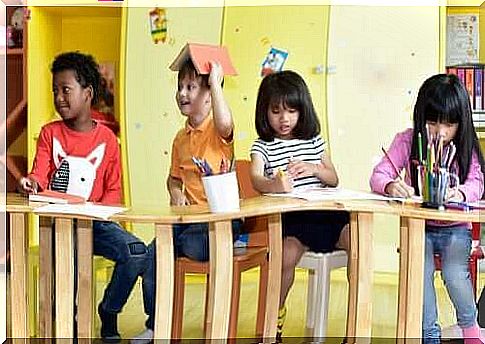The Importance Of ICT In Kindergarten And Preschool

Knowledge and application of information and communication technology (ICT) is something that educators should encourage early on. Therefore, the use of ICT in kindergarten and preschool is very important.
In kindergarten and pre-school, children between the ages of 3 (sometimes 2) and 6 are looked after and brought up. This is the age group when boys and girls should be introduced to information and communication technology for the first time.
Information and communication technology (ICT)
ICT refers to the technological resources, tools and programs that we use to process, manage and share information. It also includes the various technical devices such as computers, cell phones, televisions, game consoles, tablets, etc.
Nowadays information and communication technology plays a crucial role in our daily life. It offers us services that the “users” have become accustomed to on a daily basis. For example, e-mail, text messaging, instant messaging, web navigation, etc search engines. This list could go on and on and is getting longer.

Information and communication technology gives us the opportunity to access an unlimited amount of information. Therefore , it is vital that we acquire knowledge and skills to use these technologies.
The same applies to skills related to interpreting information. Children need to understand that not everything they read online is complete or true.
The importance of ICT in kindergarten and preschool
Knowledge and application of ICT in kindergarten and early childhood is important because it enables children to develop different skills. First and foremost, they acquire the skills related to the use of computers or tablets, such as tactile, auditory and visual skills.
In addition , they acquire additional skills and knowledge through the didactic programs, games, and applications that they use .
In other words, the use of ICT contributes to the cognitive development of preschool and kindergarten children. Dealing with computers, cell phones and other technical devices at a young age facilitates and supports learning. Of course, this contact should only take place under the supervision and guidance of your teachers or educators.
When children use technology in class, it motivates them and enables them to start looking for information and developing strategies on their own. It also gives them the opportunity to make their own small decisions as they work on their assignments. You choose, filter, search, etc.
What are the advantages of ICT in kindergarten and preschool?
The use of ICT in kindergarten and preschool:
- Promotes creativity.
- Encourages experimentation.
- Allows each child to progress and learn at their own personal learning pace.
- Develops strategies for research and information gathering.
- Arouses children’s curiosity.
- In addition , the children develop a certain degree of autonomy.
- They are also stimulated and motivated to learn.
- And finally, it contributes to the development of hand-eye coordination.
ICT in kindergarten and preschool: other important aspects
So far we have looked at the benefits and importance of ICT in kindergarten and early childhood education. However, we also need to talk about the appropriate use of ICT in kindergarten and preschool. If ICT is used excessively or misused, negative consequences can result.

In preschool and kindergarten , children need an upbringing based on games and experiences with real objects. In addition, they need contact with others and nature, they need to read stories and develop emotionally and socially.
While the use of technology plays an important role in social, collaborative and collaborative development, it can not replace the socialization that occurs through personal and physical contact with other individuals.
Therefore, it is also very important to limit the use of ICT in kindergarten and preschool. Overuse can be harmful. It can lead to poor posture, a sedentary lifestyle, and antisocial behavior.
As we have already mentioned, the use of technology in preschool and kindergarten should therefore only be carried out under the constant supervision of educators or educators. This also applies to the following levels of education.
Teachers are not only responsible for explaining new technologies to children and teaching them how to use them. In addition, they must also teach them to be critical and responsible about the information that the children have access to.
Final thoughts
Information and communication technology offers endless possibilities for direct access to a wide variety of information. Therefore, the children need to learn how to interpret this vast amount of information. This information is often incomplete, one-sided and should therefore always be viewed and interpreted in context.









